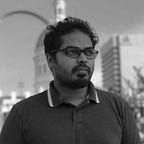Edurena — The Fate of Vrusthi
In December 2020, I was selected as one of the consolation prize winners for the KISAH Futures competition. A storytelling competition that aims to collect and share stories around themes relevant to future, post-COVID-19 scenarios. Fortunately, for me, my story did not only win a consolation prize, but also was selected to be part of the the KISAH Futures Anthology! Titled Edurena — the fate of Vrusthi, my story is set in a dystopian future where it attempts to explore the role of education in a post-pandemic world. You can read my story below and also download the anthology here.
“I don’t think I can make it ’til next week, I can feel the cancer spreading in me…” said father weakly as he tried to hide his pain from his teenage daughter.
“I’m getting close appa, I’m already moving up the ranks and within a few more days, I should get my final exam score and would certainly qualify into one of those e-residency programs,” said Vrushti in a hopeful tone, wishing it would alleviate her father’s pain.
Doubt was written all over Vrushti’s face as all her hard work was gradually coming undone as her father’s health continued to deteriorate. But in her heart, she knew education was the only way out of her misery. The faster she moved up the ranks, the faster she would qualify for an e-resident citizenship.
The year is 2050; just 30 years after the COVID-19 pandemic altered the social structure of the world. A world now run by robots and algorithms. A world where information is the greatest currency and data is the new oil. As the world spiraled into late-stage capitalism, big corporations ascended into power and peripheral countries like Malaysia are now subject to the power of the global elites. When the pandemic reached its peak, human population in cities and developed countries were significantly lowered. While the ruling class and powerful elites sheltered in their tall towers, the working class became sacrificial lambs.
When the virus eventually died off in 2049, the elites came out only to notice their cities had all the resources and facilities, but no population to advance their societies. So, the powerful did what any entity would do to maintain its dominance in the global order: it got big corporations to invest in smaller countries like Malaysia. Further reducing the sovereignty of these countries, and erasing the imaginary boundaries of nation-states, simultaneously enhancing the power of big corporations and the elites.
The investment took the form of physical facilities built in these countries. Only e-residents are given access to these state-of-the-art facilities, and in order to be an e-resident, you need to be chosen by one of the elites by participating in the global education system. As national education systems do not exists anymore, all individuals go through a unified, global education system where they are given a rank based on their intellectual ability, emotional competence, and mental stability. The higher your rank, the easier for you to be picked by one of the global elites to become an e-resident, and ultimately advance their societies in the future. But for Vrusthi, her only intention is to save her father, and she knows cancer treatment is only available in these resource-rich hospitals owned by the global elites in Malaysia.
“Welcome to Edurena — the global test.”
“Are you ready to play?”
“You are at the final stage of your test. Let’s begin.”
Vrusthi showed no signs of lethargy as she had been on the test for the past 14 hours. She didn’t want to waste any time, as with each passing hour, her father’s condition worsened. Cruising through the test, Vrusthi received a perfect score and was ranked Top 10 globally.
Immediately, a hologram appeared in Vrusthi’s room.
“Hello there, I am from the Danish government and I’d like to congratulate you on your remarkable score. Now, I would like to offer you a spot in our e-resident programme. Would you be interested?”
Vrusthi had been waiting for this for years. She gleefully replied, “Yes, yes! I am!”
“Being a Danish citizen means you can access all our facilities, from learning hubs to hospitals. In a couple of years, when your service is required, you would be flown to the Copenhagen colony. So this also means, you are no longer a citizen of Malaysia — you will be granted a stay-visa but you can no longer use Malaysian facilities, but as you’re aware the Malaysian facilities can never match what we have.”
Vrushti ended the call in delight knowing her father was going to be saved. As her father shared Vrusthi’s joy, he began to think: Are we colonised?
